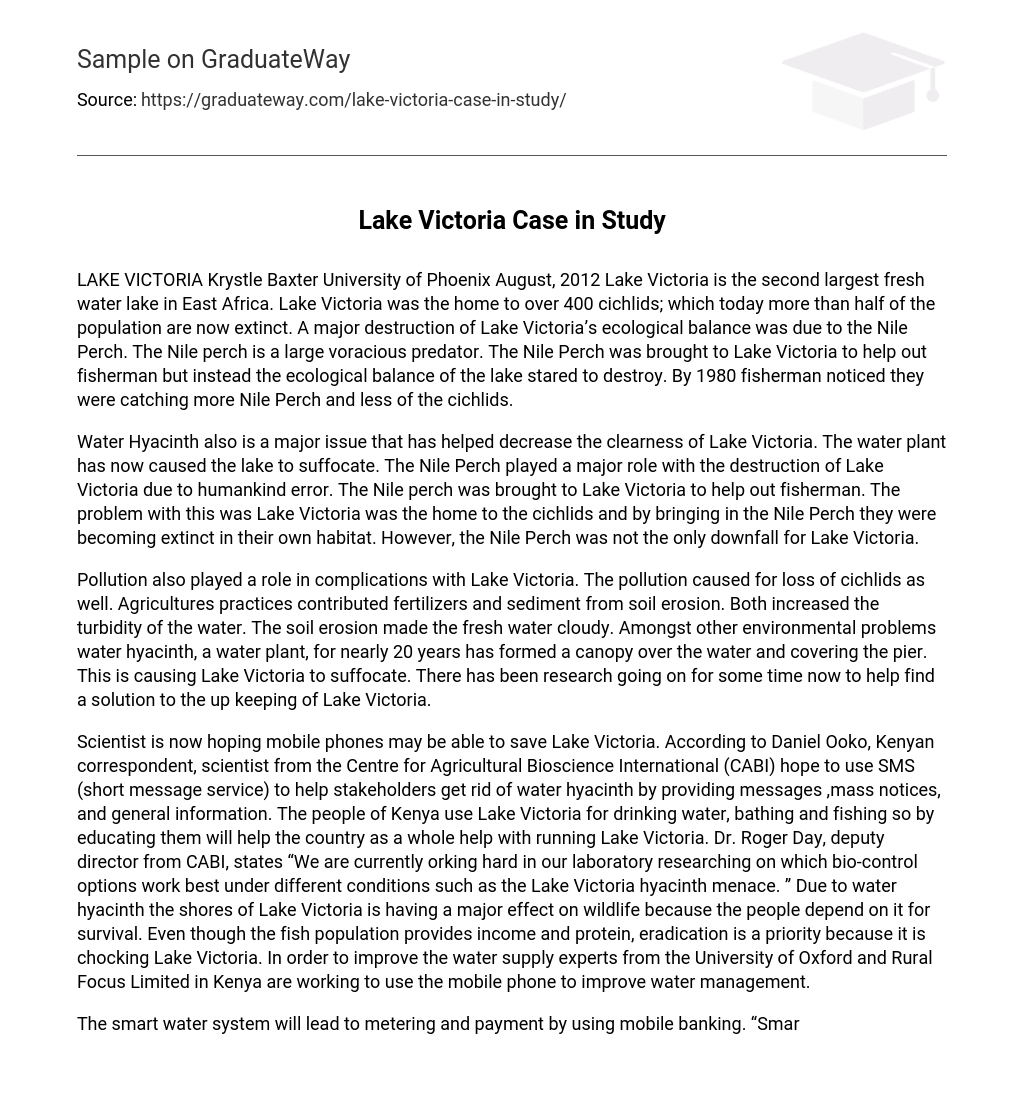The Nile Perch, a predatory fish introduced in Lake Victoria, the second largest freshwater lake in East Africa, has greatly affected its ecosystem. Initially introduced to aid fishermen, this fish species has led to the extinction of over 50% of the original cichlid population. The voracious eating habits of the Nile Perch have disrupted the ecological equilibrium, causing a decline in cichlid catches and an increase in captures of Nile Perch as reported by fishermen starting from the 1980s.
Both Water Hyacinth and the introduction of the Nile Perch have played a significant role in reducing the clarity of Lake Victoria. The suffocation caused by the plant has adversely affected the lake, while human error resulted in native cichlids becoming extinct due to the introduction of the Nile Perch. Although not solely accountable, these factors have greatly contributed to the decline of Lake Victoria.
The negative consequences of pollution on Lake Victoria have led to a decline in cichlid populations and an increase in water turbidity due to the presence of fertilizers and sediment from agricultural practices that cause soil erosion. The clarity of the freshwater has been compromised by soil erosion, resulting in cloudiness. In addition, the growth of water hyacinth, an aquatic plant, has covered the water surface and pier for nearly twenty years, posing further issues as it suffocates Lake Victoria. Extensive research efforts have been undertaken to discover methods for restoring and safeguarding Lake Victoria.
Scientists from the Center for Agricultural Bioscience International (CABI), led by Dr. Roger Day, deputy director, are collaborating with experts from the University of Oxford and Rural Focus Limited in Kenya to address the issue of water hyacinth in Lake Victoria. Their innovative approach involves utilizing mobile phones and SMS (short message service) to educate stakeholders about the eradication of this problematic plant species that is negatively impacting the lake’s shores and wildlife. This initiative aims to inform and engage the people of Kenya, who heavily rely on Lake Victoria for drinking water, bathing, and fishing activities, so that they can actively participate in preserving the lake’s fragile ecosystem. The scientists are currently conducting laboratory research to identify optimal bio-control methods for managing water hyacinth effectively. By leveraging mobile phone technology, their ultimate objective is to enhance water management practices and ensure a sustainable future for Lake Victoria.
The smart water system, with the incorporation of mobile banking, will allow for metering and payment. Robert Gakubia, CEO of the Water Services Regulatory Board, is optimistic about the positive impact the smart water system can have on millions of Kenyans by offering them sustainable, affordable, and acceptable water services. To tackle environmental concerns in Lake Victoria, experimental analysis will be conducted. Multiple tests will be performed to identify the best solution for preserving the freshwater supply amidst various complications caused by different factors.
Scientists are currently conducting experiments and tests to identify the root cause of the issue in order to discover a rational solution for preserving Lake Victoria. Preserving this lake, which is a crucial asset to Kenya and Africa, entails maintaining clean water and safeguarding its fish population. Active participation from both the community and individuals is vital in these preservation efforts. Moreover, a proposed water management solution offers potential advantages for millions of Kenyans who have the means to pay for their water.
Tests conducted by researchers have shown that efficient water management has the potential to improve water clarity, which is promising. This improvement in water quality will have positive impacts on fish reproduction, resulting in increased catches for fishermen and better support for their families. Educating the people of Kenya is also seen as a viable solution. By actively involving the community and increasing awareness about the importance of water supply and requirements, methods such as SMS, smart metering, and banking can all contribute to improving the country’s overall condition.
Moreover, penalizing companies involved in branch and firewood disposal would help eliminate pollution caused by such practices. I believe that offering alternative options can encourage individuals to make better choices. The health of families is heavily dependent on Lake Victoria, so it requires a collective effort from everyone in society to keep it clean. Scientists conducting ongoing research and regular testing can identify opportunities for improving Lake Victoria and reversing its current state of devastation.





